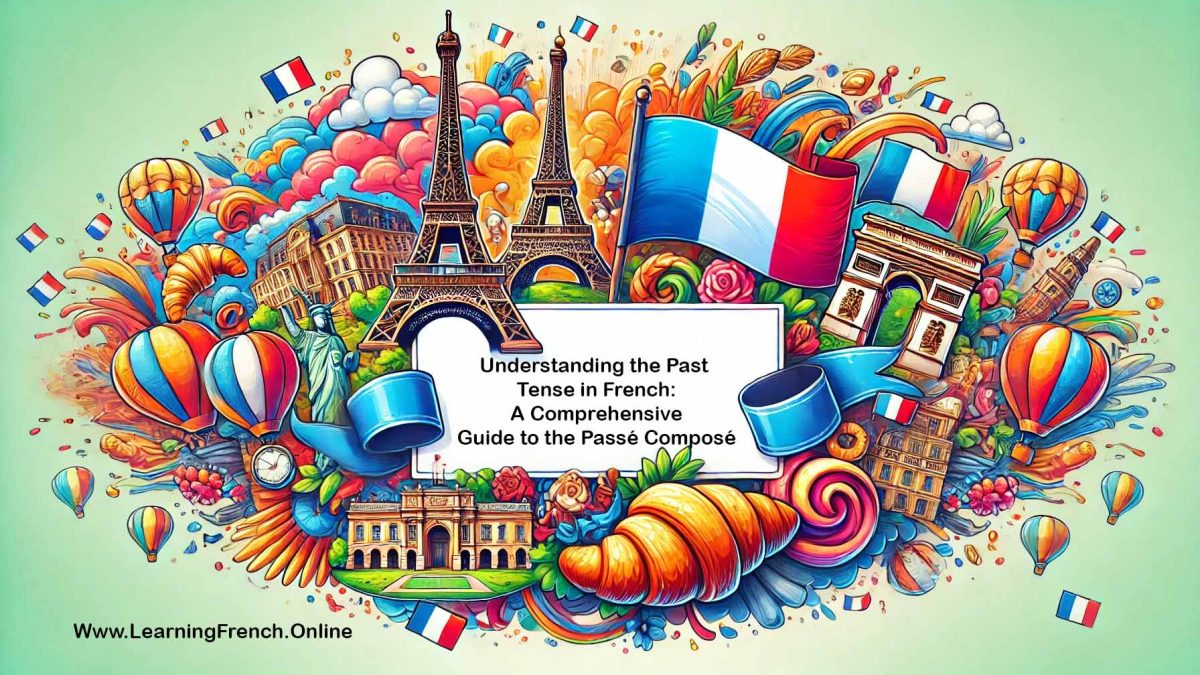
Using “C’est” in French
August 11, 2024
Understanding Reflexive Verbs in French: A Comprehensive Guide to the Present Tense
August 26, 2024Understanding the Past Tense in French: A Comprehensive Guide to the Passé Composé
Learning how to express actions in the past is a crucial step in mastering any language. In French, the most commonly used past tense is the Passé Composé. This tense is essential for talking about completed actions or events that have happened in the past. For learners at the A2 level, mastering the Passé Composé will significantly enhance your ability to communicate in French Grammar, allowing you to describe past experiences, tell stories, and discuss historical events. This comprehensive guide will explain the formation, usage, and common mistakes of the Passé Composé, complete with numerous examples.
What is the Passé Composé?
The Passé Composé is a compound tense used to describe actions that were completed in the past. It is equivalent to the simple past or the present perfect tense in English. The Passé Composé is formed using two components:
- Auxiliary Verb: The present tense of either avoir (to have) or être (to be).
- Past Participle: The past participle of the main verb.
Formation of the Passé Composé
To form the Passé Composé, you need to:
- Conjugate the auxiliary verb (either avoir or être) in the present tense.
- Add the past participle of the main verb.
Using Avoir as the Auxiliary Verb
For most verbs in French, avoir is used as the auxiliary verb. Here’s how you form the Passé Composé with avoir:
Structure: Subject + present tense of avoir + past participle
Example with the verb parler (to speak):
- J’ai parlé (I spoke / I have spoken)
- Tu as parlé (You spoke / You have spoken)
- Il/Elle a parlé (He/She spoke / He/She has spoken)
- Nous avons parlé (We spoke / We have spoken)
- Vous avez parlé (You spoke / You have spoken)
- Ils/Elles ont parlé (They spoke / They have spoken)
Using Être as the Auxiliary Verb
Some verbs, particularly those related to movement and reflexive verbs, use être as the auxiliary verb. These verbs are often referred to as “Dr. & Mrs. Vandertramp” verbs, which is a mnemonic device to remember them.
Structure: Subject + present tense of être + past participle
Example with the verb aller (to go):
- Je suis allé(e) (I went / I have gone)
- Tu es allé(e) (You went / You have gone)
- Il/Elle est allé(e) (He/She went / He/She has gone)
- Nous sommes allé(e)s (We went / We have gone)
- Vous êtes allé(e)(s) (You went / You have gone)
- Ils/Elles sont allé(e)s (They went / They have gone)
Important Note: When using être as the auxiliary verb, the past participle must agree in gender and number with the subject. For example:
- Marie est allée (Marie went).
- Les garçons sont allés (The boys went).
- Les filles sont allées (The girls went).
Forming the Past Participle
The past participle is formed differently depending on the type of verb (regular or irregular):
- Regular Verbs:
- -er verbs: Replace the -er with -é (e.g., parler → parlé).
- -ir verbs: Replace the -ir with -i (e.g., finir → fini).
- -re verbs: Replace the -re with -u (e.g., vendre → vendu).
- Irregular Verbs:
- Some verbs have irregular past participles that must be memorized.
- Examples:
- avoir → eu (had)
- être → été (been)
- faire → fait (done/made)
- voir → vu (seen)
Using the Passé Composé
The Passé Composé is used to describe actions that are:
- Completed in the past:
- Example: J’ai fini mes devoirs. (I finished my homework.)
- Happened at a specific point in time:
- Example: Il a mangé à midi. (He ate at noon.)
- Repeated a specific number of times in the past:
- Example: Nous avons visité Paris trois fois. (We visited Paris three times.)
- Occurred in a sequence of events:
- Example: Elle est arrivée, elle a vu, elle a vaincu. (She arrived, she saw, she conquered.)
Examples of the Passé Composé in Sentences
- Avoir as the Auxiliary Verb:
- J’ai mangé une pomme. (I ate an apple.)
- Ils ont regardé un film. (They watched a movie.)
- Nous avons appris le français. (We learned French.)
- Être as the Auxiliary Verb:
- Elle est née en France. (She was born in France.)
- Nous sommes partis tôt. (We left early.)
- Je suis arrivé à l’heure. (I arrived on time.)
- Reflexive Verbs with Être:
- Je me suis levé(e) à six heures. (I got up at six o’clock.)
- Ils se sont rencontrés à l’école. (They met at school.)
- Elle s’est habillée rapidement. (She got dressed quickly.)
Common Mistakes and How to Avoid Them
- Mixing up Avoir and Être:
- Ensure you use avoir with most verbs and être with verbs of movement and reflexive verbs.
- Incorrect: Elle a allé au marché. (She has gone to the market.)
- Correct: Elle est allée au marché. (She went to the market.)
- Forgetting Agreement with Être:
- When using être as the auxiliary verb, don’t forget to make the past participle agree in gender and number with the subject.
- Incorrect: Nous sommes arrivé à l’hôtel. (We arrived at the hotel.)
- Correct: Nous sommes arrivés à l’hôtel. (We arrived at the hotel.)
- Incorrect Past Participle Formation:
- Regular verbs are straightforward, but watch out for irregular verbs that don’t follow the standard patterns.
- Incorrect: J’ai faix mes devoirs. (I did my homework.)
- Correct: J’ai fait mes devoirs. (I did my homework.)
- Confusing Passé Composé with Imparfait:
- Use Passé Composé for completed actions and specific events, and Imparfait for ongoing or habitual past actions.
- Incorrect: Quand j’étais petit, j’ai regardé la télé chaque jour. (When I was little, I watched TV every day.)
- Correct: Quand j’étais petit, je regardais la télé chaque jour. (When I was little, I used to watch TV every day.)
Practice Exercises
Here are some exercises to help reinforce your understanding of the Passé Composé:
1. Conjugate the verbs in the Passé Composé using the correct auxiliary verb (avoir or être):
- Nous (manger) __ une pizza.
- Elle (venir) __ chez moi.
- Ils (faire) __ leurs devoirs.
- Tu (se lever) __ à quelle heure?
- Nous (aller) __ au cinéma. Answers:
- Nous avons mangé une pizza.
- Elle est venue chez moi.
- Ils ont fait leurs devoirs.
- Tu t’es levé(e) à quelle heure?
- Nous sommes allé(e)s au cinéma.
2. Correct the mistakes in the following sentences:
- Il a allée à la fête hier soir.
- Nous sommes fini nos devoirs avant de sortir.
- Elles ont parti sans dire au revoir.
- Je suis tombé et j’ai blessé ma main.
- Ils sont regardés un film intéressant. Answers:
- Il est allé à la fête hier soir.
- Nous avons fini nos devoirs avant de sortir.
- Elles sont parties sans dire au revoir.
- Je suis tombé(e) et j’ai blessé ma main. (Correct as is)
- Ils ont regardé un film intéressant.
3. Translate the following sentences into French using the Passé Composé:
- I finished the book yesterday.
- She left early this morning.
- We went to the park last weekend.
- They saw a beautiful sunset.
- You (informal) have already eaten breakfast. Answers:
- J’ai fini le livre hier.
- Elle est partie tôt ce matin.
- Nous sommes allé(e)s au parc le week-end dernier.
- *Ils ont vu un beau coucher de soleil.*
- Tu as déjà pris le petit-déjeuner.
Cultural Insights: The Importance of Passé Composé in French Grammar Communication
- Everyday Use: The Passé Composé is the most common past tense used in spoken French. It’s essential for discussing your day, telling stories, or recounting past events. French speakers frequently use this tense in daily conversations, making it crucial for anyone looking to become fluent.
- Understanding Context: In French, context often determines whether to use the Passé Composé or another past tense, such as the Imparfait. The Passé Composé is used when the action is seen as complete, while the Imparfait is used for descriptions or ongoing past actions.
- Storytelling: In French literature and spoken narratives, the Passé Composé is used to advance the plot, while the Imparfait is used to provide background information. Understanding this distinction can help you better comprehend French stories, news, and even movies.
Conclusion
Mastering the Passé Composé is a key milestone for any French learner at the A2 level. This tense allows you to express completed actions, narrate events, and share your past experiences effectively. By understanding how to form the Passé Composé with both avoir and être, and by recognizing the importance of past participle agreement, you will significantly improve your French communication skills.
Remember, practice is essential when learning any new grammar point. Regularly conjugate verbs in the Passé Composé, use them in sentences, and pay attention to the context in which this tense is used. With consistent practice, the Passé Composé will become a natural part of your French language toolkit. Bonne chance (good luck) on your journey to mastering the Passé Composé!

